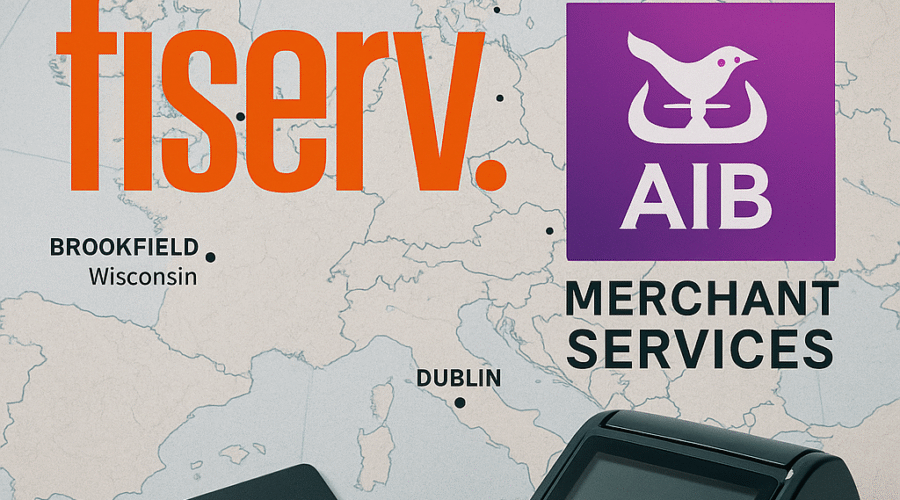In a strategic move to strengthen its European payment processing dominance, Fiserv announced the full acquisition of AIB Merchant Services (AIBMS) from Allied Irish Banks for an undisclosed sum. This transaction concludes an 18-year joint venture that positioned AIBMS as Ireland’s largest domestic acquirer and a major player in European e-commerce payments. The deal underscores Fiserv’s commitment to capitalizing on Europe’s $1.2 trillion digital payments market while enabling AIB to optimize its capital structure ahead of full privatization[2][9][15].
💼 Seasoned CorpDev / M&A / PE expertise
Strategic Rationale for Vertical Integration
Accelerating Clover Platform Adoption
Fiserv plans to leverage its complete ownership to accelerate deployment of Clover, its cloud-based POS system currently processing $200 billion in annual payment volume globally. European Clover adoption grew 38% YoY in 2024, yet remains underpenetrated compared to North American markets[3][9]. Katia Karpova, Fiserv’s EMEA Head, emphasized that unified control enables “localized product roadmaps and faster decision-making cycles” to compete with European fintechs like Adyen and Nexi[13].
Capital Optimization for AIB
The transaction boosts AIB’s CET1 ratio by 35 basis points, providing flexibility as the Irish government reduces its stake below 12.4%. This aligns with AIB’s strategic priority of maintaining a 14% CET1 buffer while funding €5 billion in green lending initiatives through 2026[2][15]. CEO Colin Hunt noted the sale allows sharper focus on core banking operations amid Ireland’s projected 5.2% GDP growth in 2025[2][16].
Market Context: European Payment Processing Landscape
Post-Brexit Competitive Dynamics
AIBMS’s established UK subsidiary positions Fiserv to capture cross-border transaction growth between EU and Britain, projected to reach £42 billion annually by 2027. This complements Fiserv’s existing Cardnet JV with Lloyds Banking Group, creating dual hubs for Sterling and Eurozone processing[4][12]. The UK entity’s 2023 payment institution license enables continued service to 23,000 UK SMEs previously at risk post-Brexit[4].
High-Risk Merchant Specialization
With 18% of revenue from gambling and gaming sectors, AIBMS brings expertise in managing high chargeback verticals (1.9% loss rate vs industry 2.4%). This complements Fiserv’s 2024 acquisition of SafeCharge, creating a €780 million niche in regulated digital entertainment payments[4][9].
Financial Architecture of the Transaction
Valuation Metrics and Synergies
While deal terms remain confidential, analysts estimate AIBMS’s enterprise value at €450-500 million based on 2024 EBITDA of €62 million and sector-average 7.5x multiples. The JV contributed €34 million to AIB’s 2024 equity income, representing a 6.8% ROE that Fiserv expects to double through operational integration[2][4].
Capital Market Implications
The acquisition follows Fiserv’s $3.9 billion bond issuance in Q1 2025, locking in 4.7% fixed rates before expected ECB hikes. Moody’s affirmed Fiserv’s Baa2 rating, citing “improved diversification in recurring revenue streams” from the transaction[9][15].
Leadership Perspectives on Strategic Alignment
Fiserv’s EMEA Growth Blueprint
Katia Karpova emphasized that full control enables “real-time product localization,” citing plans to introduce dynamic currency conversion and BNPL options through Clover by Q4 2025. This addresses the 27% of European SMEs seeking integrated omnichannel solutions[3][13].
AIB’s Strategic Repositioning
Colin Hunt framed the divestiture as part of AIB’s “three-pillar strategy” focusing on digital banking (37% mobile adoption growth in 2024) and sustainability-linked lending (€2.1 billion deployed in 2024). The bank maintains referral agreements to preserve SME relationships while shedding non-core assets[2][15].
Regulatory Considerations and Closing Timeline
The transaction requires approval from the Central Bank of Ireland and European Central Bank, with Fiserv anticipating Q3 2025 closure. Analysts see limited antitrust risk given AIBMS’s 14% share in Ireland versus Elavon’s 22% and Global Payments’ 19%[4][12]. However, regulators may scrutinize data portability commitments given Fiserv’s combined 31% share in UK-Ireland merchant services[12].
Future Outlook: European Payment Processing
This acquisition positions Fiserv to capture 40% of Europe’s projected 9.3% CAGR in contactless payments through 2030. With AIBMS’s 135 technical staff and Fiserv’s R&D budget ($1.4 billion in 2024), the combined entity aims to reduce payment authorization latency below 800ms for 95% of transactions[3][14].
Table: AIBMS Performance Metrics (2022-2024)
| Metric | 2022 | 2023 | 2024 |
|---|---|---|---|
| Gross Processing Volume | €52B | €61B | €78B |
| Net Revenue | €98M | €107M | €112M |
| Operating Margin | 51% | 53% | 55% |
Conclusion: Strategic Calculus in Payments Consolidation
This transaction exemplifies three key trends in financial technology M&A: 1) Vertical integration of bank-fintech partnerships, 2) Capital optimization through non-core divestitures, and 3) Platform-driven market expansion. As Fiserv integrates AIBMS’s 135,000 terminals across Europe, the deal creates a template for balancing regulatory compliance with innovation velocity in the $12 trillion global payments industry[4][9][12].
Sources





